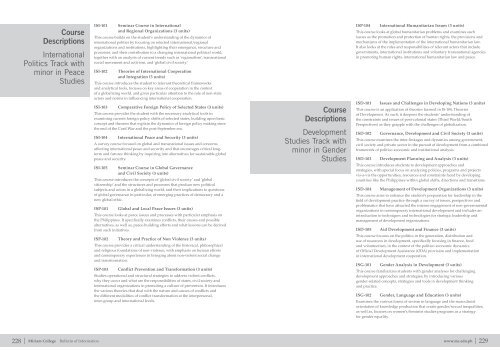MCBOI_2011-2012
MCBOI_2011-2012
MCBOI_2011-2012
Create successful ePaper yourself
Turn your PDF publications into a flip-book with our unique Google optimized e-Paper software.
Course<br />
Descriptions<br />
International<br />
Politics Track with<br />
minor in Peace<br />
Studies<br />
ISI-101<br />
Seminar Course in International<br />
and Regional Organizations (3 units)<br />
This course builds on the student’s understanding of the dynamics of<br />
international politics by focusing on selected international/regional<br />
organizations and institutions, highlighting their emergence, structure and<br />
processes, and their contribution to a changing international political world,<br />
together with an analysis of current trends such as ‘regionalism’, transnational<br />
social movement and activism, and ‘global civil society.’<br />
ISI-102<br />
Theories of International Cooperation<br />
and Integration (3 units)<br />
This course introduces the student to relevant theoretical frameworks<br />
and analytical tools, focuses on key areas of cooperation in the context<br />
of a globalizing world, and gives particular attention to the role of non-state<br />
actors and norms in influencing international cooperation.<br />
ISI-103<br />
Comparative Foreign Policy of Selected States (3 units)<br />
This course provides the student with the necessary analytical tools in<br />
examining current foreign policy shifts of selected states, building upon basic<br />
concept and theories that explain the dynamics of foreign policy making since<br />
the end of the Cord War and the post-September era.<br />
ISI-104<br />
International Peace and Security (3 units)<br />
A survey course focused on global and transnational issues and concerns<br />
affecting international peace and security and that encourages critical longterm<br />
and futures thinking by inquiring into alternatives for sustainable global<br />
peace and security.<br />
ISI-105<br />
Seminar Course in Global Governance<br />
and Civil Society (3 units)<br />
This course introduces the concepts of ‘global civil society’ and ‘global<br />
citizenship’ and the structures and processes that produce new political<br />
subjects and actors in a globalizing world, and their implications to questions<br />
of global governance in particular, of emerging practices of democracy and a<br />
new global ethic.<br />
ISP-101<br />
Global and Local Peace Issues (3 units)<br />
This course looks at peace issues and processes with particular emphasis on<br />
the Philippines. It specifically examines conflicts, their causes and possible<br />
alternatives, as well as, peace-building efforts and what lessons can be derived<br />
from such initiatives.<br />
ISP-102<br />
Theory and Practice of Non Violence (3 units)<br />
This course provides a critical understanding of the historical, philosophical<br />
and religious foundations of non-violence, with emphasis on human efforts<br />
and contemporary experiences in bringing about non-violent social change<br />
and transformation.<br />
ISP-103<br />
Conflict Prevention and Transformation (3 units)<br />
Studies operational and structural strategies to address violent conflicts,<br />
why they occur and what are the responsibilities of states, civil society and<br />
international organizations in promoting a culture of prevention. It introduces<br />
the various theories that deal with the nature and causes of conflicts and<br />
the different modalities of conflict transformation at the interpersonal,<br />
inter‐group and international levels.<br />
Course<br />
Descriptions<br />
Development<br />
Studies Track with<br />
minor in Gender<br />
Studies<br />
ISP-104<br />
International Humanitarian Issues (3 units)<br />
This course looks at global humanitarian problems and examines such<br />
issues as the promotion and protection of human rights, the provisions and<br />
mechanisms of the implementation of the international humanitarian law.<br />
It also looks at the roles and responsibilities of relevant actors that include<br />
governments, international institutions and voluntary transnational agencies<br />
in promoting human rights, international humanitarian law and peace.<br />
ISD-101<br />
Issues and Challenges in Developing Nations (3 units)<br />
This course is an application of theories learned in IS-104, Theories<br />
of Development. As such, it deepens the students’ understanding of<br />
the constraints and issues of post‐colonial states (Third World/South<br />
Perspectives) as they grapple with the challenges of globalization.<br />
ISD-102<br />
Governance, Development and Civil Society (3 units)<br />
This course examines the inter-linkages and dynamics among government,<br />
civil society and private sector in the pursuit of development from a combined<br />
framework of politico-economic and institutional analysis.<br />
ISD-103<br />
Development Planning and Analysis (3 units)<br />
This course introduces students to development approaches and<br />
strategies, with special focus on analyzing policies, programs and projects<br />
vis-a-vis the opportunities, resources and constraints faced by developing<br />
countries like the Philippines within global shifts, directions and transitions.<br />
ISD-104<br />
Management of Development Organizations (3 units)<br />
This course aims to enhance the student’s preparation for leadership in the<br />
field of development practice through a survey of issues, perspectives and<br />
problematics that have attracted the intense engagement of non-governmental<br />
organizations in contemporary international development and includes an<br />
introduction to techniques and technologies for strategic leadership and<br />
management of development organizations.<br />
ISD-105<br />
Aid Development and Finance (3 units)<br />
This course focuses on the politics in the generation, distribution and<br />
use of resources in development, specifically focusing in finance, food<br />
and volunteerism, in the context of the politico-economic dynamics<br />
of Official Development Assistance (ODA) provision and implementation<br />
in international development cooperation.<br />
ISG-101<br />
Gender Analysis in Development (3 units)<br />
This course familiarizes students with gender analyses for challenging<br />
development approaches and strategies, by introducing various<br />
gender‐related concepts, strategies and tools in development thinking<br />
and practice.<br />
ISG-102<br />
Gender, Language and Education (3 units)<br />
Examines the various forms of sexism in language and the masculinist<br />
orientation of knowledge production that create gender/sexual inequalities,<br />
as well as, focuses on women’s/feminist studies programs as a strategy<br />
for gender equality.<br />
228 | Miriam College Bulletin of Information<br />
www.mc.edu.ph | 229


